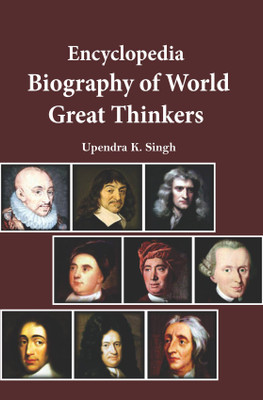Encyclopedia Biography of World Great Thinkers (15 Vols. Set)(Hardcover, Dr. Upendra Kumar Singh)
Quick Overview
Product Price Comparison
A person who uses intelligence primarily for personal or professional purposes is called an intellectual or thinker. In its substantive or adjective form, it describes the output of these individuals, the so-called "life of the mind" in general, or a feature of something that emphasises knowledge, intelligence, and critical thinking, as in "the intellectual level of the discourse on the matter was not high." Unlike the broad property, the intellectual is a particular kind of intelligence that is only related to reason and thought. In many professions, such as medicine, athletics, or the arts, intelligence is applied to abilities that may have a psychomotor component; nevertheless, these occupations do not always demand the practitioner to be in the "world of ideas." The distinguishing characteristic of an intellectual person is that their mental abilities go beyond mere intelligence; rather, they concentrate on considering the philosophical, esoteric, abstract, and value of their thought processes. Though an intellectual does not always actively engage in academia, he or she may have an academic background and is usually associated with a vocation. Historically, the scholarly and intellectual classes were closely linked. Scholars in the humanities, particularly those studying philosophy, who discuss significant social and political issues are referred to as "intellectuals" in certain contexts, particularly in journalism. These scholars are public intellectuals who explain the theoretical underpinnings of solving societal issues; scholars typically stick to their fields of specialisation, while intellectuals apply their knowledge and abstraction to public issues. Although the term "intellectual" is used to refer to both "academics" and members of the educated ├®lite in North America, the sociologist Frank Furedi stated that "intellectuals are not defined according to the jobs they do, but [by] the manner in which they act, the way they see themselves, and the values that they uphold." Intellectuals and academics differ in that intellectuals engage in open, modern public discourse and converge with it; academics who venture outside of their academic fields to speak to the general public are considered public intellectuals. In general, people who engage in public discourse from the disciplines of culture, the arts, and the social sciencesŌĆöincluding lawŌĆöare more frequently referred to as "intellectuals" than people who work in the natural sciences, applied sciences, mathematics, and engineering.


